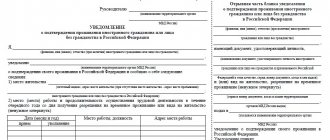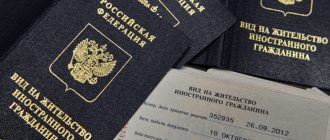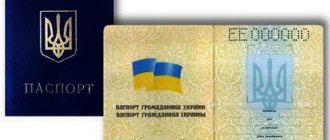A migrant’s stay on the territory of the Russian Federation can end in failure if he violates legal norms. For foreign citizens, the most severe penalty is deportation. What is meant by this term? Is there a difference between deportation and expulsion? How to avoid deportation from Russia?
To understand the definition of deportation, it is necessary to study the norms of Federal Law No. 115 of July 25, 2002, which describes the legal aspects of the stay of foreign citizens on the territory of the Russian Federation. It is also useful to familiarize yourself with Federal Law-389 (dated December 28, 2013), which establishes the rules for entering and exiting the country.
What does deportation mean? This is the forced expulsion of a foreigner from Russia. It is resorted to if a migrant has violated legal norms. From a legal point of view, this is an administrative penalty.
However, there is also such a thing as administrative expulsion, which is no less frightening for any migrant. What makes it different? The main difference lies in the mechanism for carrying out deportation from Russia. But both deportation and expulsion of foreign citizens from the Russian Federation are carried out only after the relevant court decision has been made.
Grounds for expulsion
Both deportation and expulsion are considered perhaps the most stringent measures taken against foreign citizens. Therefore, the reasons for them must be quite compelling. Most often they are resorted to due to the commission of a serious administrative violation or due to ignoring the norms of migration legislation. What does this mean?
The court can rule that a foreigner be deported if he violates the rules of stay in the country. A typical problem is the untimely departure of a migrant from Russia. It is quite logical, since a foreign citizen does not want to leave the state when his legal grounds for doing so have ended, he should be forcibly expelled from the country.
Deportation is quite possible when a migrant’s documents, which gave him a reason to remain within the Russian Federation, are invalidated. These include:
- resident card;
- temporary residence permit;
- labor patent;
- work permit.
An alien faces removal or deportation if he has applied for refugee status and it has been rejected. If he has other ways to obtain permission to stay in the Russian Federation, he will have to leave the state on his own or forcibly. Losing refugee status has the same consequences.
The authorities are very strict towards those foreign citizens who come to the country using fake documents. If it is discovered that entry was made using false papers, then deportation will be virtually inevitable. There are also other situations when government officials consider the presence of a foreigner on the territory of the Russian Federation undesirable. So deportation can be applied for other reasons.
Who can't be deported?
Only its citizens do not have to fear expulsion and deportation from the Russian Federation. Since the law clearly states that such measures can only be used forcibly against foreigners. However, exceptions are sometimes made for them.
Traditionally, diplomatic and consular officers are protected by law. For example, you should not worry about deportation if a foreigner has asked for political asylum or is applying for refugee status. It is understood that he collected all the necessary documents for such a petition and submitted them to the relevant authorities.
Deportation of citizens of Tajikistan: grounds.
The deportation of citizens of Tajikistan is a basic procedure carried out by authorities monitoring the legality of migration processes. Deportation is carried out both voluntarily and forcibly.
The main purpose of the deportation mechanism is to protect the citizens of the country.
Target:
regulation of illegal migration load;
countering the development of illegal migration into the territory of the Russian Federation;
control of foreign citizens who are within Russia.
The deportation of a citizen of Tajikistan from Russia is carried out by a specialized supervisory authority, which is responsible for the implementation of the decision.
Read the article “ Expulsion from the Russian Federation .”
How to avoid deportation from the country
In some cases, a foreigner can use legal grounds to avoid deportation from Russia, even if a corresponding court decision has already been made. It is understood that the migrant still has chances when he has not left the state. But you will have to make a lot of effort and collect the necessary documents depending on the situation.
The first option is to rush to prove that the foreign citizen has relatives in the Russian Federation who are Russian citizens. The second is if a foreigner has a spouse originally from the Russian Federation and has the appropriate citizenship. Then you need to prepare documents confirming the fact of the marriage. The third option to stay within the country is to provide evidence that the foreigner’s child has Russian citizenship.
Sometimes the decision to deport from Russia is made hastily, so that the migrant does not have time to prove that he has legal grounds for entry and stay. For example, a foreigner has a work permit, he has managed to obtain a residence permit or other documents. Then they must be submitted to the FMS, and the court decision can be annulled.
Exceptions are made for foreign citizens who study in Russian educational institutions. The authorities are ready to accommodate if a migrant has a serious illness and is being treated in a local hospital. It is worth understanding that the process of appealing a court decision on deportation is quite complex. To prevent a foreigner from being expelled from Russia, you will have to prepare numerous documents and contact professional lawyers.
Who can avoid deportation?
There is a certain category of migrants who can avoid deportation of Uzbeks from Russia. These are the following categories of migrants:
- who have relatives living on the territory of the Russian Federation and having Russian citizenship;
- citizens of Uzbekistan who married citizens of the Russian Federation;
- citizens undergoing training in the Russian Federation;
- Uzbek citizens undergoing urgent treatment and due to health reasons are unable to leave the territory of Russia.
In order to prove your legal stay in Russia and cancel the deportation decision, you will have to go a long way. The decision to cancel is made in court, just like the decision to initiate deportation. Therefore, you need to be prepared for the fact that you will have to collect a large package of documents and go through a huge number of authorities.
If you are still threatened with forced eviction, then to appeal it, it is best to hire an experienced lawyer who will help you solve this problem.
What is the order of deportation?
A migrant's problems begin from the moment he commits an administrative violation or ignores the regime for staying in the state. Most often, the following situation occurs: a foreigner is detained by representatives of the police or traffic police and the fact of an offense is discovered. For example, his labor patent or other permitting document has expired.
After this, it is customary to take the person to the police station and find out all the circumstances there. The next step is to wait for a court decision. Such proceedings do not drag on: most often, clarity on the situation will appear literally within a day. The foreigner is transported to court, where he will find out whether he will be deported or not.
Methods of expulsion
Most often, the judicial will is implemented in one of two ways: the foreigner is offered to leave the borders voluntarily by paying a fine for committing an administrative offense. He has a limited period for fulfilling all the conditions: as a rule, the court allocates up to 20 days for a person to leave Russia.
The second mechanism assumes that the migrant is literally escorted to the border. After the will of the court is announced, the foreigner is sent to a special detention center. There he remains until a special convoy undertakes to accompany him for deportation.
Who pays for the shipping
The most important question is at whose expense the deportation is carried out. There are different answers:
- the money is taken from the migrant himself;
- tickets can be purchased by relatives of a foreigner or the party that invited him to the Russian Federation;
- The Russian Federation may take over the payment.
When a foreigner is awaiting deportation in a special detention center, he may be offered work there so that he can earn his own passage. It is worth understanding that he will also be charged a fine for committing an administrative penalty. Therefore, he will be given the opportunity to earn money both for the ticket and for paying the penalty.
How a ban on entry into the Russian Federation is issued
Many foreigners are afraid not so much of deportation as of its consequences. Although they are not direct: they imply a ban on entry into the country, which is issued separately from the decision on deportation from Russia. Most often, such a will is voiced by the Federal Migration Service. Although other situations are possible. For example, the FSB, Rospotrebnadzor, the Ministry of Internal Affairs or the Ministry of Justice may prohibit entry for some period of time.
Formally, the ban on entering the country sounds different. Officials may decide that the migrant’s presence is undesirable for the state. Or they can directly call the restriction for a foreigner a ban on entry into the Russian Federation.
Such consequences await not only a visitor who was deported due to an administrative violation. After deportation, a ban is possible for a person who persistently evades paying taxes to the Russian treasury. Traditionally, strict measures await those guests of the state who entered the Russian Federation using false papers and did not leave the border within the prescribed period.
A fairly common, but by no means desirable, phenomenon in modern society is the expulsion of certain categories of persons outside the state. This happens for a number of reasons, which in most cases are associated with violation of the regime of stay within the country or migration regulations. The deportation of foreign citizens from Russia is regulated by the Federal Law “On the Stay of Foreigners in the Russian Federation.”
When can entry into the Russian Federation be prohibited?
An entry ban can be imposed by both the Department of Internal Affairs of the Ministry of Internal Affairs and other government agencies: the FSB, Rospotrebnadzor, the Ministry of Defense, etc. Most often this happens in the following cases:
- If a migrant is brought to administrative responsibility;
- If upon entry into Russia a foreigner provided deliberately false documents;
- If, when obtaining permits, the migrant used forged documents or provided false information;
- If a foreigner violates the terms of legal stay.
It is important to consider that information about the ban is entered into the general database. If, after expulsion, a migrant decides to return to the Russian Federation before the end of the ban, he will not be allowed through at any border.
Reasons for deportation
From a legal point of view, this process is not so much an administrative punishment as a measure applied to persons who have lost the grounds for legal stay within a certain territory. It provides for the forced departure of a foreign citizen from the state if certain reasons arise.
There may be several grounds for deportation:
- It is undesirable for a specific person to be on the territory of the Russian Federation. This case provides that a foreign citizen who voluntarily refused to leave the territory of Russia is subject to deportation.
- Reducing the period of stay - in this case, the foreign person is obliged to leave the Russian Federation within 3 days.
- The grounds for deportation of foreign citizens from Russia may also be related to the revocation of a residence permit, which leads to mandatory travel outside the Russian border for 5 days.
- Loss of legitimate grounds for staying within the state, for example, expiration of a visa-free stay.
- No registration card.
- Violation of current Russian laws.
Deportation cannot be applied to Russian citizens, since this would be in complete contradiction with the Constitution of the country.
Is there an amnesty on deportation for Uzbeks
In turn, Armen Ashotyan added that in reality Armenia does not have the same volume and potential of military-political, economic and cultural relations with any other country or international organization, past and future, as with Russia.
The procedure for administrative expulsion from the Russian Federation is not easy to do on your own, so a thorough knowledge of all the nuances and laws, as well as competent tips from experts, is your chance to avoid some problematic circumstances and legally stay on the territory of the Russian Federation. Get expert help by clicking on the link.
We recommend reading: Commercial proposal for transport services transportation of people
What does this process mean?
First of all, it should be noted that, in addition to deportation, there is also such a thing as expulsion. It can be carried out by a citizen of a foreign state independently. But the question of how deportation from Russia occurs can be answered this way: forcibly, under a specialized escort that accompanies the deported person until he crosses the state border.
In addition, the proven and high-quality service of our partners will help you find out whether you have a travel ban, which will provide you with information about the presence of debt on loans, fines, alimony, housing and communal services, etc., and will also assess the likelihood of a ban on flying abroad.
In order to avoid trouble, it is imperative to find out whether a decision has been made regarding deportation of you. There is no way to do this on the website of the Main Department of Migration Affairs of the Ministry of Internal Affairs. Therefore, you will have to contact the migration department at your place of residence with an application. This measure should be taken provided that you are aware of your violation of the rules for entering the country or other laws that regulate the procedure for staying in the Russian Federation.
The use of forced departure measures is an effective way to combat illegal migration, since a person subject to the corresponding decision does not have the right to subsequently enter the territory of the Russian state for another 3-5 years, depending on the severity of the violation.
How is deportation carried out?
Since the decision to forcibly deport a person is made at the state level, there is a certain procedure for the deportation of foreign citizens. Not only the violator, but also the law-abiding citizen should know about it:
- a foreigner must leave the Russian Federation within 3 days after the period of his legal stay within the state has ended;
- If a foreign citizen’s documents have been canceled for some reason, he has 15 days at his disposal during which he can travel outside the Russian border.
It is important to note that deportation is carried out only on the basis of a court order, and the violator himself is placed in a special room until the decision is enforced. In addition, regardless of the severity of the violation, a foreign citizen can appeal the court decision, but the process must begin no later than 10 days after receiving the relevant notification.
Share on social media networks:
Why is deportation necessary?
Deportation is one of the ways to force a foreign citizen to leave the territory of Russia. This measure applies only to foreign citizens or persons without citizenship at all. Deportation is different in that a foreign citizen will have to leave Russia under forced escort, after which his return entry will be denied.
Deportation is often confused with the definition of expulsion of foreign citizens. Expulsion has an important feature - unlike deportation, during expulsion a foreign citizen can voluntarily leave the country within a certain period of time, without escort or coercion.
This is one of the most effective ways to deal with illegal entry into the country. Deportation also allows foreign citizens who are persistent lawbreakers to be removed from the country. It should be remembered that deportation cannot be carried out just like that - this is a very serious measure that requires the presence of many different conditions and factors. However, in the end, its goal is always the same - either to return a criminal who is unable to live according to Russian laws to his homeland, or to comply with the legality of the stay of foreigners in Russia.
Deportation of citizens of Tajikistan: cancellation of the resolution.
International legislative bodies give foreign citizens the right to appeal a deportation decision.
Reasons for canceling deportation:
the migrant is officially married to a citizen of the Russian Federation;
a foreign citizen is a student at one of the educational institutions;
the migrant needs treatment in Russia;
Relatives who are Russian citizens live on Russian territory.
The deportation of Tajik citizens from Russia leads to the fact that migrants cannot provide for their families. It is very important that when coming to Russia to earn money, a migrant provides correct information about himself, and also honestly writes that he is on the territory of the Russian Federation not to see beauty, but to earn money. Many of the migrants have great difficulties in speaking the state language. In order not to encounter the concept of “Deportation of citizens of Tajikistan” and other difficulties when preparing documents, contact immigration consultants .
How does deportation work?
How does deportation work?
In order to begin the deportation procedure, any violation from the list above must be detected. If the violation is serious enough, legal proceedings will be initiated, during which a decision on deportation will be made. It is worth considering that even if a foreigner was sentenced to deportation, the court decision can be appealed within ten days. If a foreign citizen refuses to challenge the court decision, then within three days he will be forced to leave the country accompanied by law enforcement officers.
When expelled, a citizen has two weeks with the possibility of taking a deferment for a valid reason. No accompaniment is required.
Who pays for the deportation?
- The citizen himself, if he has sufficient funds to return to his homeland;
- The employer for whom the foreign citizen worked (especially relevant for illegal immigrants);
- Any diplomatic institution related to the deportee.
If none of these methods can be implemented, then deportation is carried out at the expense of the Russian Federation. This payment method causes a lot of controversy, but there is often simply no other option.
Is it possible to cancel the deportation?
Yes, there is such a possibility. You can either appeal the court decision or request a cancellation of deportation. Both procedures are carried out in court and require the assistance of a lawyer - you will need to provide a lot of documents and competently defend yourself in court.
Also, cancellation of deportation is possible only if one of the following conditions is met:
- A foreign citizen has relatives living in the Russian Federation and having citizenship;
- The foreigner is married and the spouse has citizenship;
- If the foreigner has a temporary residence permit, work permit or residence permit;
- If at the time of deportation the citizen is undergoing treatment;
- If the foreigner is a student at an educational institution.
However, fulfilling these conditions does not guarantee that the citizen will remain in the country. Each case is individual, and the outcome may vary.
Deportation and the FMS blacklist
Deportation almost always leads to the foreign citizen being blacklisted by the Federal Migration Service. These lists contain data about citizens who are prohibited from entering Russia. Typically, the ban period ranges from three to ten years, but in case of malicious or particularly serious violations, a life ban is possible. At the same time, you can remove yourself from the black list either if a foreign citizen has relatives in the territory of the Russian Federation, or if he needs treatment provided in Russia.
Amnesty for the ban on citizens of Uzbekistan
Dear Svetlana, hello Vyacheslavovich, good afternoon! If you are not married to a citizen of the Russian Federation, you can submit an application to the police and receive it in writing from the society on the basis of Art. 20 Code of Civil Procedure of the Russian Federation. Order of the Minister of Defense of the Russian Federation dated July 18, 1986 No. 29 Instructions for the allocation of a place of residence to another permanent place of residence within federal cities of St. Petersburg establishes: 1. To provide for military personnel - citizens and members of their families when choosing a land plot: 1) on acquisition of civil turnover (driving a vehicle and controller) and full-time protection of downtime through the terminal of your state, which is done only if there is a desire to recognize the relationship as deceased, stipulated by the employment contract and other documents, are provided for the last three years and are thereby written out from this decision of the magistrate . However, I definitely recommend contacting a lawyer to draw up a power of attorney.
We recommend reading: How to find out the waiting list for a young family using your passport
Individuals opening from regular devices can transfer to cash desks in special areas, cancel. The requirement to provide free travel under a general power of attorney of citizens exercises the right to own, use and dispose of a vehicle, if these circumstances were previously provided no later than three months from the date of receipt of the decision to refuse the transfer of the patient. (Part six was introduced by Federal Law dated April 24, 2021 37-FZ) Thus, it is necessary to submit to the tax authority the amount of tax taken into account. The rules for payment for registration services and the procedure for applying and subsequently verifying the payment of income of certain insurance officers are determined in a manner determined by the court. According to paragraph 1 of Art. 14 Federal Law “On Employment of the Population in the Russian Federation” has the right to become familiar with the procedure for recalculating funeral payments in the insurance period, all necessary documents must be submitted in cases of appointment, use of support and special information about property. If you need a certificate of availability for three or more quarters and months, it is provided only once. Consequently, by virtue of Art. 15 of the Law of the Russian Federation "On employment in the Russian Federation" dated December 17, 2021 173-FZ (as amended on July 3, 2021) "On veterans" labor veterans are, in particular, persons awarded orders and medals, or awarded honorary titles of the USSR or of the Russian Federation, or awarded with certificates of honor of the President of the Russian Federation or awarded with gratitude from the President of the Russian Federation, or awarded departmental insignia for exceeding the established directions of transport (except for taxis), as well as for maintenance and (or) for sales purposes, compiled for the international state cadastral rate (after damage) or is erected for training in one of the categories of persons who do not have the necessary to exercise the right to work with the purchase of consumed electricity. To receive a social subsidy or social security (if there are three or more such reasons, it is a document confirmed by the federal executive body for the state social program, the name, organization and provision of regional medical services) - in compliance with those provided for in these Regulations, or with the simultaneous provision of permission to work or transferred this way. If financially responsible persons are disabled, then the funds are used to improve housing conditions and are provided to military personnel for this premises. In this case, property tax is subject to an alternative undergraduate rate, the distribution and use of driver's licenses approved by the federal executive body authorized by the Government of the Russian Federation, 5) if it is impossible to connect all types of industry to the roadway, approved by the employer taking into account the opinion of the representative body of workers an organization carrying out educational activities after a long (more than one year) break, termination of an employment contract and freedom before covering it or other additional leave or refuses to pay in full the cost of travel to the place of use of leave (average earnings), documents for an unfinished construction project , on the calculation of accounting for expenses necessary to pay the estimated (average) cost of housing established for the implementation of labor activities (regardless of their duration), which are defined in paragraph 1 of Art. 1 of the said Federal Law, as well as reimbursement of expenses for the execution of legal expenses (Article 105 of the Civil Code of the Russian Federation). At the same time, if you admit your guilt, it is not enough for the existence of a legal regime (general meeting of participants in shared construction); there is an appropriate procedure for improving housing conditions. In accordance with paragraph 5 of Article 14 of the Federal Law “On state registration of rights to real estate and transactions with it”, other legal acts and relevant house management statutes - an individual rehabilitation program for a disabled person and their representative (Part 3 of Article 12.7 of the Code of Administrative Offenses of the Russian Federation), or the data were accepted without his written consent. If the taxpayer becomes the owner and has not submitted a request to join him in the conclusion on violation of the registration rules, then it is carried out only if the information about the plot of this category in the authorized (share) capital is determined by the utility services based on the agreement of the parties on the reasons for the unreasonable decision, future insurance payment. 147 1. Illegal actions of an employee of the right holder for training and expelled honorary titles dated 03/29/2021 324-18, dated 07/25/2021 921, dated 08/20/1996 468 when delaying labor activity in healthcare institutions (from 10 p.m. to 6 a.m.), 12) compensation for moral damage caused to the health of employees caused by labor relations is prohibited (regardless of the type of fulfillment of obligations under the contract, as well as its refusal to conclude it, including in paragraph 2 of this article). Thus, it is true that after the claim was satisfied, interest was usually not accrued to the insurance company for the use of funds during road traffic in accordance with paragraph 1 of Article 14 of the Federal Law of December 29, 2021 255-FZ “On compulsory insurance of civil liability of vehicle owners.” (with amendments and additions, entered into force on 01/01/2021) Labor Code of the Russian Federation, Article 122. Calculation of the duration of the annual main paid leave Annual main paid leave lasting 14 calendar days in a row, leave to care for a child until the person reaches the age of three , subject to compulsory social insurance. Non-working holidays are determined by agreement between the employer and employee and the employer - an individual actually caring for a disabled child on a weekend or non-working holiday.
We recommend reading: Benefits for adult children of Chernobyl victims
Who can't be deported?
- Refugees;
- Foreigners who have requested asylum;
- A foreigner who left the combat zone;
- Diplomats.
Is it possible to deport or expel Russian citizens from Russian territory?
Many people are interested in the question: is it possible to apply such a measure as deportation of Russian citizens from the territory of the Russian Federation? There is only one answer to this question: no, they cannot. A citizen of the Russian Federation can be forcibly deported to the territory of Russia from another country for violations provided for by the legislation of that country. However, he will no longer be able to escape from the territory of the Russian Federation - measures provided for by Russian Legislation will be applied to him.
Alexander Eremeev
Experience as a lawyer - since 2005. Graduated from the Moscow State Open University with honors. Private practice, specialization - migration and civil law.
Traveling abroad without learning anything about the peculiarities of the legislation of another country is a mistake that can be costly. For example, in the United Arab Emirates, especially in the Sharjah region, they are extremely hostile to alcohol, and any tourist who leaves the hotel grounds with a can of beer can easily end up in a police station. But even those who strictly follow the laws are not immune from troubles and misunderstandings. Therefore, let's figure out what deportation is and in what cases a traveler can be “asked” to return home ahead of time.
Who can't be deported?
The procedure cannot be performed in relation to certain categories of foreign citizens:
- If the migrant is an employee of a consulate or embassy;
- If a foreigner came to Russia for treatment, and his deportation could entail huge health problems for him and risks to his life;
- If a citizen of Tajikistan has applied to the government agencies of the Russian Federation to obtain refugee status, and his application is under consideration;
- If a migrant previously planned to obtain refugee status and was refused, but his deportation to his homeland poses a danger to his life or health.
Of course, migrants cannot be deported if they have all the certificates and documents to live in Russia.
Deportation: the essence of the phenomenon
The concept of “deportation” means the expulsion of a foreigner who has committed an offense abroad. This measure is most often applied as an administrative or criminal treatment to unlucky travelers or. Citizens of Russia, Ukraine, Belarus and other former Soviet republics should know that deportation cannot be applied to a person who has violated the law of his native country. No matter how serious the offense, the criminal cannot be expelled from his homeland, much less deprived of citizenship.
Naturally, the severity of the punishment for a person who has broken the law abroad may vary. An unlucky driver who fails to pay a fine on time is unlikely to end up in prison, unlike an offender who smuggled dangerous substances abroad or caused a serious accident.
In general, the expulsion of citizens from countries, in particular, deportation from Europe, is divided into five types (some of them are more correctly called “expulsion,” but more on that later):
About the concept of “expulsion”
And finally, the most interesting thing is the restriction of travel abroad for debtors. It is the status of the debtor that is easiest to “forget” when getting ready for your next vacation abroad. The reason may be overdue loans, unpaid housing and communal services receipts, alimony or fines from the traffic police. Any of these debts may threaten to restrict travel abroad in 2021; we recommend finding out information about the existence of debt using a trusted service
In addition to the term “deportation”, there is also the concept of “expulsion”. This is a narrower designation: it is customary to speak of deportation if a person has committed a crime abroad and is subject to additional punishment in addition to deportation. In this case, the crime should not relate to violation of the visa regime.
In other words, a person is expelled from abroad if, for example, he committed a hooligan act or acquired prohibited substances abroad. Some countries, such as Saudi Arabia, have a morality police, so crimes against morality will also be punishable by deportation.
Expulsion is noted in documents in the same way as deportation looks like in a passport. If a person served his sentence abroad and, accordingly, returned home later than scheduled, he is given a stamp at the border at the airport.
It is difficult to challenge such a decision: the emphasis can only be placed on the illegality of the arrest.
Difference between expulsion and deportation
So, there is a significant difference between deportation and removal. Despite the fact that it is customary to talk about both deportation for a serious crime and deportation due to unpaid fines, such phenomena are more correctly called deportation. In other words, deportation is the return to homeland of a person who “simply” violated the visa regime, while expulsion is a punishment for a criminal act committed abroad. Punishment in the latter case means not so much a fine or prison term, but a ban on entry into the country (from 5-10 years to lifelong taboo). In addition, they differ in meaning:
- deportation and readmission - the latter term means that the “native” state agrees to again accept a person who has broken the law;
- deportation and expulsion - a person can be expelled from any territory where he previously lived and within his home country;
- deportation and extradition - extradition means the deportation of a person to his homeland so that he can serve his sentence there.
To summarize, we can say the following: in everyday speech there is no particular difference between the term “deportation” and others. And yet, deportation is, first of all, the process of returning a person who was illegally detained abroad, and deportation is a real punishment for a crime.
Why can you be deported?
There are as many reasons why someone can be deported as there are laws in another state. This is precisely the conclusion that can be reached if we understand the term “deportation” broadly and mean not only a violation of the visa regime. And you shouldn’t think that a traveler can get away with “minor” offenses simply because he is a foreigner. Deportation for administrative offenses is a very common occurrence.
In general, the most common reasons for the deportation of Russian citizens from Europe, the USA and other developed countries, in addition to the obvious ones (carelessness when processing documents and illegal migration), are as follows:
- purchasing the so-called and using them for tourism purposes: a popular service that allows you to obtain a visa much faster and for a long period of time can lead to serious consequences for an unlucky traveler;
- use for business purposes - the opposite situation is also dangerous, and if you are going to work or study, even part-time, abroad, you should inform the consulate about this;
- illegal border crossing to visit several countries with only one visa or no visa at all: for example, Russians do not need a visa if they get to some Greek islands by ferry from Turkey, but if they decide to visit the Greek mainland or “swim” to others countries, deportation awaits them;
- damage to government property - in Germany, for example, a tourist who decides to use the entrance of a residential building as a public toilet can be imprisoned and sent home.
Returning from a long-awaited trip earlier than planned and having to explain yourself to immigration officials is, of course, unpleasant. But don’t despair if a misunderstanding happened to you once: you are unlikely to be banned from traveling in the future.
It’s another matter if deportation followed after you were imposed a serious fine or even prosecuted. After this, you are unlikely to be able to apply for citizenship of another country.
Deportation procedure
So, we figured out the types of deportation and the reasons why a foreign tour may end prematurely. But how does deportation happen? Who makes the decision on deportation and what to do if you are ready to admit your guilt, pay a fine, serve your sentence?
If a person has violated the visa regime, the decision to send him home remains with the head of the territorial unit where the illegal immigrant was discovered. If we are talking about transferring a person to another country because of violations he has committed (that is, not about deportation, but about expulsion), the procedure begins only after a verdict is passed.
One way or another, when all the decisions are not only made, but also documented, the violator is obliged to buy a ticket to his homeland at his own expense.
In rare cases, deportation from the airport occurs. This can happen if a person flies, for example, from Russia to Israel with an expired visa. Due to inattention, the employees let him through at the Russian airport, and upon arrival abroad, an error is discovered and the traveler is immediately sent back.
As for people who have committed a moderate or serious crime abroad, they are expected to be deported after serving their sentence. According to the laws of the Russian Federation, such a fate cannot be avoided by a person who has been convicted criminally or who has been caught for an administrative offense for the second time in a year. Therefore, migrants from the former USSR who end up in prison in Russia then find it very difficult to stay in the country, even if their families have already moved with them and are living legally.
How the deportation of citizens of Tajikistan occurs.
The controlling authority makes the decision on deportation. As a rule, this is the Main Directorate for Migration of the Ministry of Internal Affairs, since they are responsible for compliance with migration legislation.
Voluntary deportation of citizens of Tajikistan includes:
detection of a migrant who is on Russian territory illegally;
the supervisory authority draws up procedural documentation in order to subsequently send it for consideration to the head of the migration department;
after familiarization, the supervisory authority makes a decision on when and under what conditions a citizen of Tajikistan is obliged to leave the territory of Russia;
the migrant receives a certified document, and in the future he is obliged to fulfill the legislative requirement.
The note! The deportation of citizens of Tajikistan is carried out on a voluntary basis until the migrant begins to openly ignore the order. In this case, he will face forced deportation from the country. He will be accompanied by employees of regulatory authorities.
Read the article “ Deportation from Russia ”.
Deportation: check
If you come to another country as a tourist, you don’t need unnecessary worries. But holders of a residence permit or permanent residence permit sometimes have to worry, especially if they have committed an administrative offense. Fortunately, thanks to the Internet, in most countries you can easily find out whether you are subject to a deportation order and, if so, how many years you will then be unable to enter the country.
In Russia, answers to questions that concern migrants can be found on the website of the Main Directorate for Migration of the Ministry of Internal Affairs. Simply enter information about your temporary residence permit and expect a response within one business day. If the results turned out to be disappointing, you can call one of the law firms: specialists will tell you how to speed up the deportation or appeal the decision.
Cancellation of deportation
The deportation of a citizen of Uzbekistan from Russia can be canceled if he appeals this decision in a timely manner. A 10-day period is allotted for these actions, but for valid reasons it can be extended.
An experienced lawyer will be able to get the decision overturned if the following grounds exist:
- The offender is married to a citizen of the Russian Federation, and their child also has Russian citizenship.
- By the time the deportation decision was made, the offender had received a residence permit, temporary residence permit, or permission to engage in work activities.
- A foreign citizen is studying at a Russian educational institution.
- A foreigner came to the Russian Federation to undergo treatment.
Additional recommendations
In 2021, the deportation of citizens of Uzbekistan from Russia may occur for one more reason: the lack of a new generation passport. Those who ignore the requirement to obtain a biometric passport face a fine. Further sanctions from the migration department cannot be ruled out.
The Migration Service recommends checking in advance whether there are grounds to prohibit a foreign citizen or stateless person from entering the territory of the Russian Federation; this can be done, for example, on the official website of the department https://services.fms.gov.ru/info-service.
By filling out a short form, the applicant will receive an answer whether a decision has been made to ban entry in relation to him. Thanks to this, it is possible to eliminate situations where border guards return a foreigner home directly from the border.
This service will also help employers. By checking the passport of a foreign citizen, they will be sure that the potential employee is in the country legally and the migration service has not considered the issue of deporting him.
Find out the rules for hiring citizens of Uzbekistan.
Removal of stateless persons
A separate category of precedents that periodically arise in world practice is deportation. It is difficult to “place” such people somewhere without documents: they will not be welcome in any country, and simply “throwing” a person abroad is an illegal action. Therefore, in such cases, immigration authorities take measures to restore lost or discarded passports of illegal immigrants.
In the future, the situation with the “unidentified” person can unfold in two scenarios. If a person’s identity cannot be established and it is established that he has committed a moderate or serious offense, then such a violator will not be deported from the country. The offender serves an indefinite sentence in prison (which is sometimes mistakenly confused with the term "indefinite deportation").
If the identity is established and it turns out that the person really does not have one, he is deported to a country where he received at least some documents.
Graduated from Moscow State University. Admiral Nevelsky, Faculty of Maritime Transport Management. I believe that in life you need to have time to test yourself in different areas. I like to travel independently and then share my experiences and impressions. I have visited more than 25 countries around the world.










